Jason Reynolds, founder of Jinxbot and co-founder of the zero-waste nonprofit PrintCycle, is leading the charge. With a passion for innovation anden ...
Garret’s Podcast Journey in the World of Dinosaurs
Written by: Esther Strauss
Esther is a business strategist with over 20 years of experience as an entrepreneur, executive, educator, and management advisor.
Published on January 17, 2024
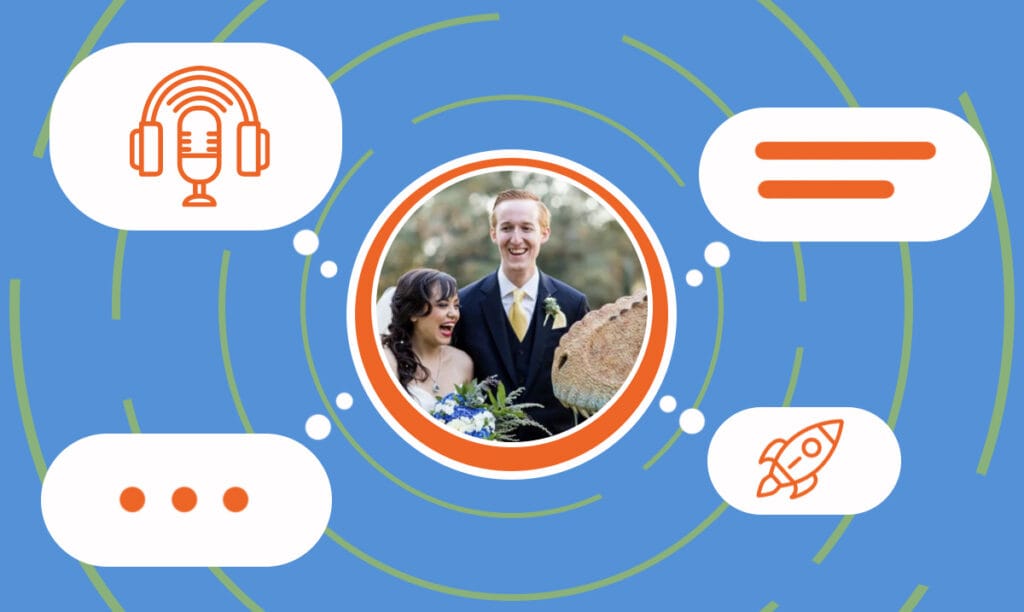
Welcome to our special interview segment, where today we’re thrilled to have Garret, the co-host of the fascinating and much-loved I Know Dino podcast. This unique show has captivated a wide audience with its engaging and informative exploration of all things dinosaurs. From the latest discoveries in paleontology to in-depth discussions with experts, Garret and his co-host Sabrina bring the ancient world of dinosaurs to life for listeners around the globe.
Today, we’ll delve into the journey behind I Know Dino, uncovering the inspiration, challenges, and successes of running a niche podcast. We’ll also gather valuable insights and tips for those aspiring to start their own podcasting adventure. So, let’s dive into the prehistoric world with Garret and discover what it takes to create a roaringly successful podcast!
Conceptualizing the Podcast
SBS – What inspired you to start a podcast about dinosaurs, and how did you conceptualize the format and content of I Know Dino?
IKD – We grew up loving dinosaurs. Sabrina nearly wore out her VHS tape of Land Before Time, and Garret did wear out his favorite Stegosaurus hat.
Like many kids, our interests changed as teenagers. But we rediscovered our love of dinosaurs together when we lived near the American Museum of Natural History, and we were able to visit often.
A few years later, we had a dinosaur-themed wedding.

After the wedding, we didn’t want to stop talking about dinosaurs. We noticed at the time that while there were, and still are, some great paleontology podcasts, there weren’t any weekly dinosaur podcasts covering every new dinosaur (there’s one about every week).
So we decided to start our own podcast. Garret had been listening to podcasts for a while at that point, which gave us an idea of what format and segments we wanted in our show. Sabrina had experience in journalism and radio, so she had ideas about how we should cover the topics on our show.
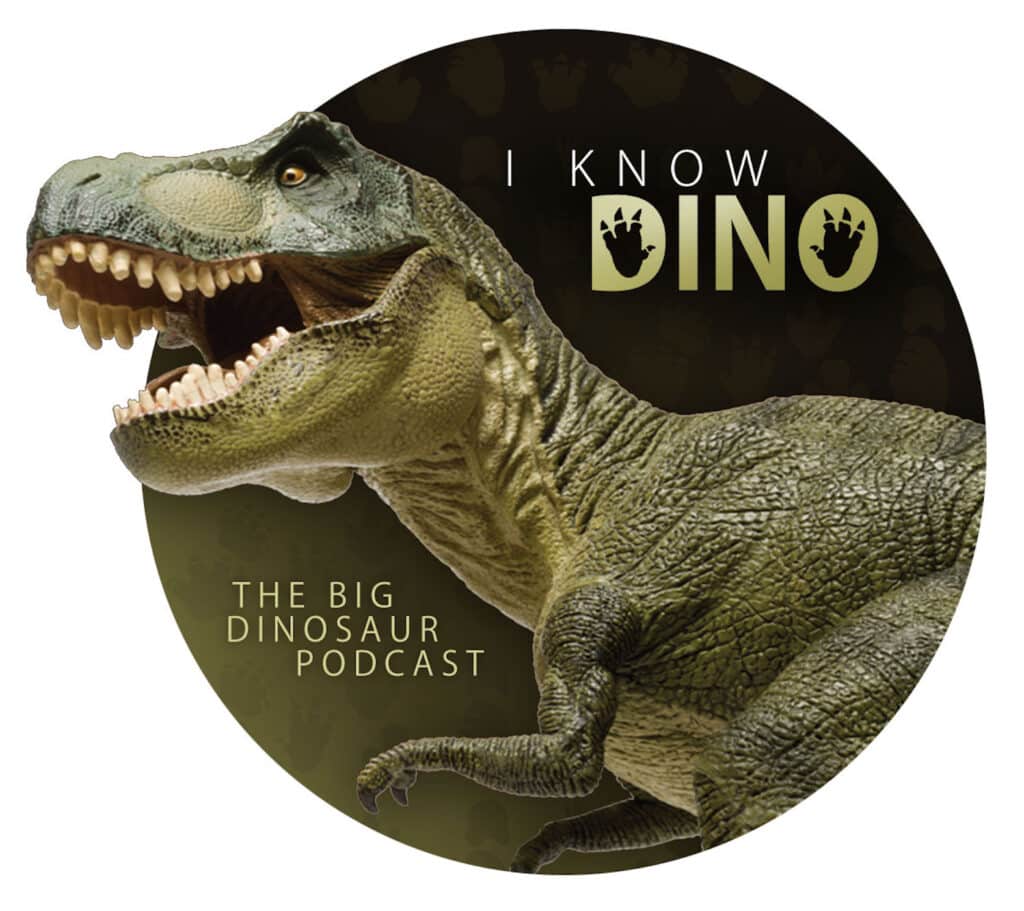
We launched in January 2015, just a few months before the movie Jurassic World came out. We reached out to paleontologists to interview them for our show and did lots of research so we could ask interesting questions.
Each episode has three main segments:
- Dinosaur news
- “Dinosaur of the Day,” where we dive deep into a listener-requested dinosaur
- Fun fact
We also pepper in other segments, including:
- Interviews with experts
- A “Dinosaur Connection Challenge” where we connect any topic requested by listeners to dinosaurs
- Listener Q&A
- We also recently tested a “Dinosaurs on Trial” segment where listeners submitted dinosaurs with a reason they like (or don’t like) them, and we held mock trials on the show
Our show is constantly evolving based on feedback from our listeners.
Audience Engagement
SBS – How do you engage with your audience and encourage them to participate in your podcast?
IKD – Podcasting can be a very one-sided conversation, but we’ve found a few ways to encourage our listeners to participate.
- We do listener surveys every year to hear what people like or dislike about our show. We also get feedback on ideas for new segments, virtual events, and more
- We keep a list of interview suggestions from listeners
- We always try to credit everyone who submits something we include in the show or our website (for example, suggesting dinosaur museums for our map)
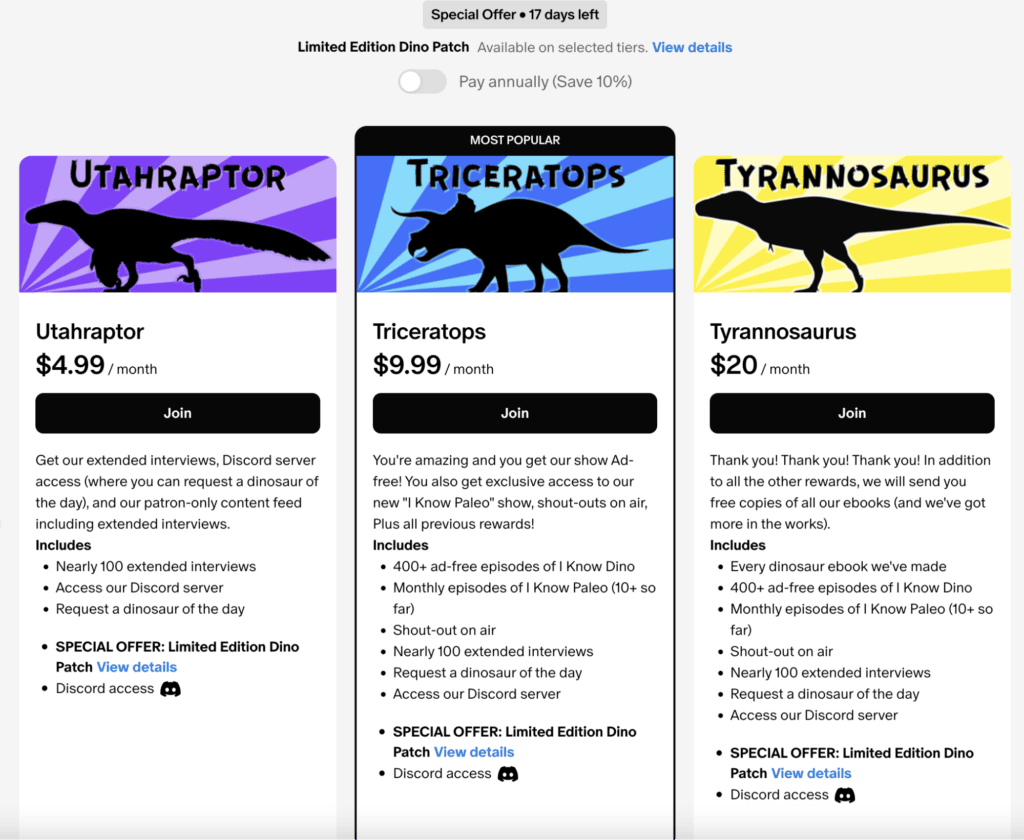
For those who support us on Patreon, there are multiple options for engaging with us:
- We have a Discord channel exclusively for our patrons to interact directly with us and other members of our community
- We shout out patrons on the show
- We ask for questions and do dedicated Q&A episodes
- We keep a list of dinosaur requests for the “Dinosaur of the Day”
- We run polls for our monthly patron-exclusive podcast called I Know Paleo (about all the non-dinosaurs)
- We have hosted dinosaur film and documentary watch parties
Content Research and Development
SBS – What is your process for researching and selecting topics for each episode?
IKD – We hear about new discoveries from listeners, press releases, mailing lists, Google alerts, forums, blogs, and more. We keep a running list and then group the stories by theme. Examples of themes include dinosaur sizes, what dinosaurs ate, and, of course, newly named dinosaurs.
For each story, we read through the primary sources. For lengthier, more narrative episodes, we also read books and watch films where relevant. The two of us put together our own notes, and we discuss what we learned for the first time when we record the show.
Guest Selection and Interviews
SBS – How do you choose and approach experts for interviews, and what preparation do you do for these interviews?
IKD – Our listeners often suggest who we should chat with, and we keep a list of all of those requests.
Sometimes a discovery is really groundbreaking and we’ll reach out to the authors of that paper. We also often meet paleontologists and other dinosaur experts at conferences or through friends in the field.
Dinosaur enthusiasts are very approachable and are generally happy to come to talk about their work on our show!
How we prepare depends on the topic of the interview. This can include reading a book someone just published, reading their past research, watching previous interviews they’ve done, or digging into their work. Our goal is always to have a fun and educational conversation.
Balancing Education and Entertainment
SBS – How do you balance the educational and entertaining aspects of your podcast to appeal to both experts and newcomers?
IKD – This is probably the most challenging part of the podcast. For the first few years,, listeners in our surveys told us we didn’t have enough banter or entertaining comments, so we worked on that for a while. Once we got to a point where half of the feedback was “not enough banter” and the other half was “too much banter,” we figured we got the balance right. It also helped to learn more about the subjects so we felt comfortable talking without a script. In general, we try to keep the show as conversational and light as possible while getting all of the key details across.
To limit the amount of jargon and explanations it helps a lot to build our episodes around a theme. That way, we can introduce topics and words at the beginning of the show and build throughout the episode. We also try to use consistent language from episode to episode as much as possible. Then, if a listener needs to look up a word or can figure it out from context, hopefully, they can remember the word next time (which wouldn’t be possible if we were using too many synonyms).
Technical Aspects of Podcasting
SBS – Can you share insights into the technical setup and equipment you use for your podcast?
IKD – We did a lot of research and have gone through many microphones and recorders over the years. We settled on a setup that works well in our home studio connected to a computer and on the road without a computer.
Today, we have four dynamic microphones (Shure SM58s), so if we’re interviewing two people in person, we can each have our own mic. We use a portable recorder/audio interface (Zoom P4), studio monitor headphones (Sony MDR-7506), mic stands, pop filters, windscreens, and other accessories to record.
We use the software iZotope RX to clean up our audio, Hindenburg and Descript to edit, and then go back to iZotope RX to master the audio.
Marketing and Promotion
SBS – What strategies have you found most effective in marketing and promoting your podcast?
IKD – We want to grow our show to reach as many fellow di-know-it-alls (a.k.a. dinosaur enthusiasts) as we can. We do this through a combination of collaborating with other science communicators and dinosaur experts, posting on social media, making extra content, and building a newsletter.
Collaboration is probably the most effective and rewarding way to build. We look for collaborators whose work we enjoy because our audience will probably enjoy them too.
We collaborate in a few ways:
- Guest appearances, where we appear on each other’s shows
- Feed drop swaps, where we host an episode of another show on our feed and vice-versa
- Promo swaps, where we endorse each other’s shows, often at the end of an episode
Our email list is also effective. Each week we send out a newsletter with highlights from our most recent episode.
One way we grew our email list was by building out a sequence of emails we could send to people who wanted to know more about the dinosaurs that appeared in Jurassic World. It helped that we’d covered them all as part of our “Dinosaur of the Day” segment.
We created a landing page where people could subscribe and paid for ads on Facebook, Google, and Reddit. Facebook and Google had good conversion rates, though Reddit did not. Once people signed up, we sent them a daily email for 30 days with three quick facts about a different dinosaur, along with a link where they could listen to more details in the episode where we’d covered them as the “Dinosaur of the Day.”
Most people have stuck around since, and a few have even become our patrons! Plus, we’ve gotten some lovely email responses.
Monetization and Funding
SBS – How do you monetize your podcast, and what advice would you give to others looking to generate revenue from their podcasts?
IKD – The main advice we would give is to not focus on generating revenue to start. It’s much more important to build an audience. Focus on making the best content you can as consistently as possible, and then worry about monetizing later.
Today, we monetize in a number of ways, but the main two are sponsorships and Patreon.
For sponsorships, it’s a matter of figuring out what our audience wants and then reaching out. We want to provide value to both our listeners and the sponsor. To do that, we always make sure we like the brand or product so we can authentically recommend it.
For Patreon, we regularly ask for feedback from our community and try to keep offering perks and benefits that we know they’d find valuable. Most of our members join because they want to support us, but offering valuable content can help a lot.
We offer different perks at different levels. Our list of rewards includes exclusive gifts, ebooks we’ve written, weekly ad-free episodes of I Know Dino, monthly episodes of I Know Paleo, shout-outs on air, nearly 100 extended interviews, the option to request a dinosaur of the day, and access to our Discord server.
Challenges and Problem-Solving
SBS – What have been some of the biggest challenges you’ve faced with your podcast, and how have you addressed them?
IKD – You can’t pursue every opportunity; you need to pick and choose.
In 2022 we had our first baby. Part of our preparations, in the six to eight months before she was born, was to create enough content so we wouldn’t lose momentum while we took some time off to care for her. We recorded 16 episodes in addition to creating our usual weekly show.
We conducted lots of interviews. Luckily our interviewees were very understanding as to why their episode wouldn’t get released for a few months. We read dozens of extra books and journal articles and watched multiple documentaries. We planned out episodes based on our most recent listener survey.
We also created videos and social media posts that we scheduled ahead of time. And, of course, we let our listeners know exactly what to expect (we got a lot of congratulatory messages and some very thoughtful care packages).
Our baby was due around the time Jurassic World: Dominion came out. That made it really hard to create extra content around the movie and promote it well. We did go to a drive-in movie theater very soon after having our baby and recorded an episode the week the movie came out — which was both fun and challenging.
We also hosted a fun livestream with a very talented artist and one of our favorite people who worked on the Jurassic movies just before we went on parental leave.
But there were a lot of things we had to say “no” to. We weren’t able to make it to a press day for Prehistoric Planet. We couldn’t do an interview for Dinosaur Day. We had to postpone interviews with paleontologists who’d published topical articles and books. The list goes on.
And it was OK. We still got everything we needed to get done work-wise for our parental leave. And over the summer, we actually grew our number of listeners.
Consistency and Growth
SBS – How do you maintain consistency in your podcast production and grow your listener base over time?
IKD – We keep each other motivated. We know that a new episode needs to be recorded every week, and we always make sure to get it done. We take pride in the fact that we’ve never missed a week in nine years.
Our Discord server is also a great source of encouragement. It’s very motivating to read messages from people excited about dinosaurs.
We also try to streamline and automate repetitive tasks whenever possible. We hired an editor to do a first pass of our episodes. We track the results of our projects, so we let go of what’s not working.
We don’t want to let our listeners down, and we always keep them in mind. Our biggest goal is always to produce the best show possible every week.
Community Building
SBS – What role has community building played in the success of your podcast?
IKD – A huge part! Not only financially, but our community also keeps us going each week with their enthusiasm. They have contributed so much to our show, and it wouldn’t be the same without them.
They let us know what parts of our show are their favorites and which parts could be better. They send us suggestions for news, interviews, dinosaurs of the day, and many other things to cover on our show. Many of them financially support us so we can try new things, like more narrative episodes. And they send us words of encouragement whenever they can tell we’re sick or having a difficult time. There’s no way we would have made it nine years without our community being so supportive.
Future Plans and Goals
SBS – What are your future plans and goals for the I Know Dino podcast?
IKD – In general, we have more ideas than time to execute. We recently started our monthly spinoff podcast called “I Know Paleo” for our patrons. We want to create more videos, so we’re in the process of building a new studio in our backyard. We’ve written a book for National Geographic Kids that will be coming out next year. And eventually, we’d really like to start doing in-person events or maybe even open a museum!
Advice for Aspiring Podcasters
SBS – Finally, what advice would you give to someone who wants to start their own podcast, particularly in a niche area like yours?
IKD – Make sure that you’re very passionate about the subject — you’ll need to talk about it regularly for years. Be realistic about if you have time to keep it up.
Take a good look at what podcasts are already out there. You want to add something new — new information, a new perspective, or a new format that someone else isn’t already doing.
Once you’ve decided to start, don’t be afraid to invest time and energy in learning new skills. Connecting seemingly disparate skills can help you build something great.
Building websites, public speaking, scientific literacy, photography, writing, creating email funnels, connecting with people online, graphic design, audio editing, optimizing for SEO, conducting webinars, creating ads, constructing quizzes, shooting video, coding, 3D printing, event planning, product marketing, fostering community…these things don’t necessarily sound related, but they’re all skills we’ve learned over the past decade that we’ve applied to I Know Dino.
A podcast can include anything that you’re passionate about. So if you’re interested in something, dive into it. Build up your skills. You can use them later, either to enhance your current project or to apply them to your next big idea.
Subscribe to Our Newsletter
and gain insider access to cutting-edge business insights and trends.
Featured Resources
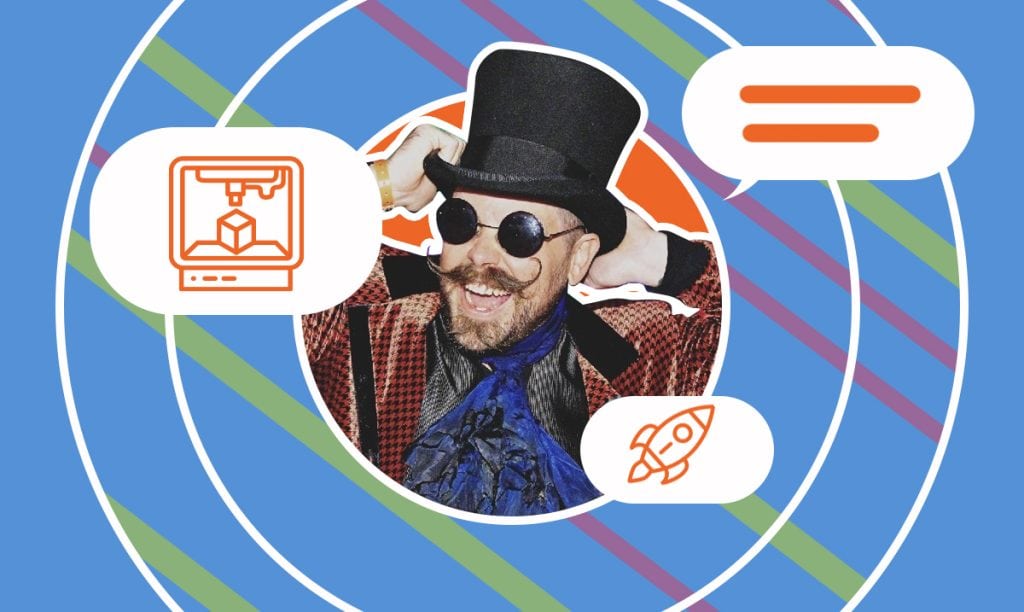
How Jinxbot Leads Zero-Waste 3D Printing
Published on January 14, 2025
Read Now

How Blaze.tech Is Empowering App Creation Without Coding
Published on January 8, 2025
Nanxi Liu, co-CEO and co-founder of Blaze.tech, is transforming the app development world with a platform that empowers anyone to buildsophisticated ...
Read Now
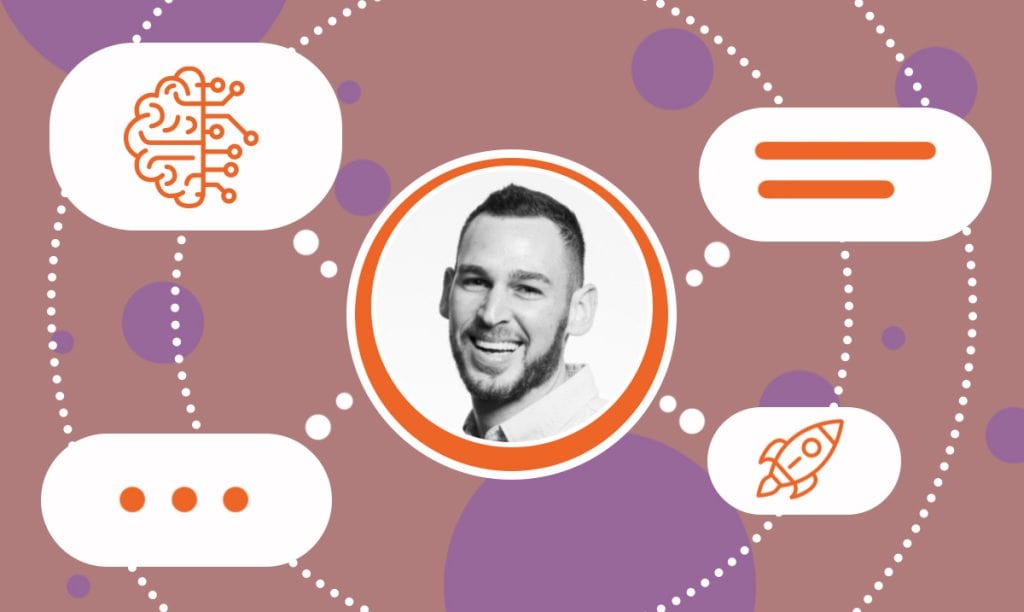
How One No-Code AI Tool is Changing the Game for Excel Users
Published on August 19, 2024
Meet David Bressler, the visionary founder behind Formula Bot, an AI-powered tool that has dramatically simplified the way Excel users manage theird ...
Read Now
Comments